wrestling / Columns
The 8-Ball 04.12.12: Top 8 Worst Musical Performances by Wrestlers
Welcome, ladies and gentlemen, to the 8-Ball. As always, I am Ryan Byers, and I am coming off of one of my more controversial lists, at least if you define “controversy” in terms of the number of comments that I received disagreeing with my opinions. This week, we’re covering a topic that is related to last week’s topic, and, before we get there, we’ll address some of the folks who disagreed with last week’s entries.
Of course, that all comes after the logo . . .
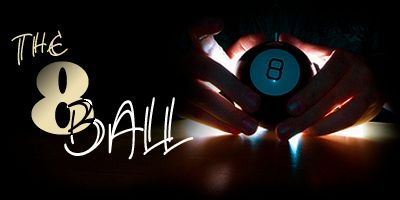
Top 8 Worst Musical Performances by Wrestlers
Yes, last week we highlighted the BEST musical performance by wrestlers, and now we’re checking the flip side of the coin with the WORST musical performances by wrestlers. If anything, this list was actually the harder of the two to assemble, because the music produced by wrestlers is terrible much more often than it’s tolerable, so I had a lot more options this time around.
However, before I get into the list proper, I wanted to give my rationale for some of the more frequently mentioned exclusions that commenters raised after reading last week’s “best” list:
1) Some people asked why I didn’t include either of the two songs used by Three Count in WCW. I actually didn’t consider them for the list because I was under the impression that Three Count was lip syncing a track laid down by studio singers and not actually singing themselves.
2) Another WCW omission some weren’t happy about was “Rap is Crap” by the West Texas Rednecks. I liked “Rap is Crap” when I first heard it on Nitro, but, the older I got and the more I thought about the angle, the less comfortable I was with its racial undertones.
3) A couple of folks wondered about the lack of John Cena and R-Truth. I just find their style of rap too sanitized to be any good. I think of them more as a modern Men on a Mission than I do anything I would actually listen to outside of wrestling.
4) Also in the rap genre, a few people mentioned Randy Savage‘s rap album, though I think they were mainly bringing it up as a joke. I will seriously say, however, that you won’t find Savage’s album on this “worst” list. Yeah, some of the lyrics were cheesy, but, all in all, the production as pretty good and Savage’s effort was strong all things considered. So, it’s not great, but it’s not nearly as bad as the stinkers below.
5) Finally, the omissions that really got people up in arms were The Honky Tonk Man, the entrance music for Ted DiBiase, and the many themes of Jacques Rougeau. In all of those cases, the performances were omitted for the same reason. I want these lists to highlight a variety of genres and periods of time, and to that end I felt it was better to make one selection from the late 1980s/early 1990s WWF entrance theme pool than it was to allow that group to take up half or more of the list. The one song I picked from that era was Shawn Michaels’ “Sexy Boy,” because it was the most enduring and has become the most iconic.
With all of that said, let’s move along to this week’s list of the WORST Musical Performances by Wrestlers . . .
8. “Stand Back” by Vince McMahon
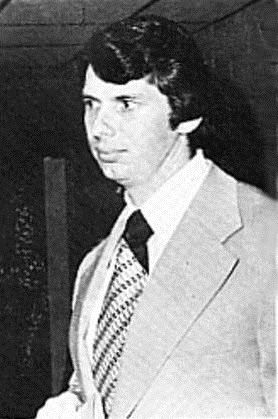
This one should look pretty familiar, as there have been at least two angles within the last several years that have used footage of Vinnie Mac performing “Stand Back” at the 1987 Slammys in order to poke fun at the chairman of the board. And, I admit it; the Slammy performance was brimming with kitsch and schlock. However, McMahon’s performance of “Stand Back,” which was originally released on Piledriver: The Wrestling Album 2, isn’t on this list because of how Vince looked with a backing band of WWF wrestlers. Instead, “Stand Back” is on this list because of the song’s content and the fact that it was chosen for McMahon to sing.
Now, why would Vince McMahon be given lyrics to sing that involve “having grand plans” and stopping anybody who might get in his way? To answer that question, you’ve got to take a look at what was going on in 1986, when the song would have been developed for its recording in 1987. The WWF was just a few years into its expansion from regional territory to national promotion, and it was in the process of fighting off once-strong challenges from the likes of Jim Crockett Promotions and World Class Championship Wrestling, not to mention toppling the formerly dominant AWA. “Stand Back,” if you examine the lyrics closely, was essentially Vince McMahon’s big musical middle finger to anybody who had opposed him in the past or might consider trying in the near future, and there’s something about that brashness, that arrogance, that just rubs me the wrong way. I mean, really, can you imagine the CEO of Coke singing a song about the demise of Pepsi or the board of directors of Nike recording a diss track about the guys over at Reebok?
Of course you can’t. It’s a huge display of ego and extremely unprofessional, which is why it sticks out in my mind as a horrible performance.
7. “With My Baby Tonight” (Live Version) by the Road Dogg
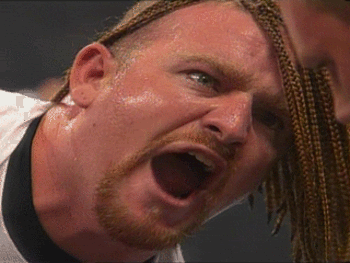
There were a couple of guys who, in last week’s comments, suggested that this song should have made by “best” list. And do you know what? It probably WOULD have stood a good chance of making last week’s list if it had just been featured solely in pre-recorded format and nobody tried to perform it live. I’m not a big country music fan, but the song had a catchy hook, lyrics that were surprisingly not embarrassing for a wrestling song (given the subject matter), and a good, solid crossover with the more, ahem, “southern” demographic that wrestling will often draw to the arenas. However, somebody in the WWF hierarchy decided that it would be a good idea to have the “Real Double J” Jesse Jammes sing the track live each and every time that he made his way to the ring.
The problem was that, as soon as he did this for the first time, his entire “country music singer” gimmick was blown and it became pretty clear that he was on the same level as the most talented guy at any given metropolitan karaoke bar. Though some performances were better than others, each had at least one fairly glaring flaw, usually related to the fact that Dogg’s voice wasn’t quite strong enough to carry the song the whole way through and he started to sound winded before he got to the squared circle. Like I said, he was the best guy at the karaoke bar. Fans aren’t going to want to watch television to see something that they just as easily could have watched at the local tavern, and “Stone Cold” Steve Austin in the video clip above expresses the same sentiment that the majority of us in the audience were feeling when we saw him heading to the ring.
6. “Waking Up Alone” by Hillbilly Jim
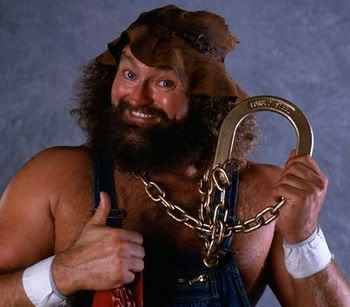
As I noted when discussing WWE Originals in last week’s column, WWE Superstar-performed music was pretty damn fun when it was done with a wink and a nod but got exponentially worse when the promotion and the wrestlers started to take their music seriously.
One of the key examples of this is Hillbilly Jim. On the original Wrestling Album, Jim got to sing “Don’t Go Messin’ with a Country Boy,” which most readers will recognize as his long-time entrance theme. “Country Boy” was obviously meant to be hokey and over the top, and, though not necessarily the best, it was a fine entry that fit into the campy fun of the whole album. Yet, when the WWF decided to put together Piledriver: The Wrestling Album 2 and when they decided to give Hillbilly Jim another song to sing, they went another way with it. Instead of something in the vein of “Country Boy,” Jim got paired up with a studio singer named Gertrude for a ballad titled “Waking Up Alone,” about the emotional lows experienced by a wrestler and his wife/girlfriend/whatever she was supposed to be when the grappler is on the road. As we’ll see again further up on the list, WWF wrestlers singing love songs never works. This was one of the first big examples of the concept, as the Fed’s apparent effort to repackage Hillbilly Jim as some sort of muscled up Jim Nabors was more laughable than laudable, with the song ending up as more of a laughingstock than a tearjerker. Hell, after listening to this thing, I was getting ready to rename him Emobilly Jim.
So, don’t go messin’ with a country boy . . . unless he’s on the road, which in case he’s very likely to be too busy crying to do anything about it.
5. The GLOW Rap
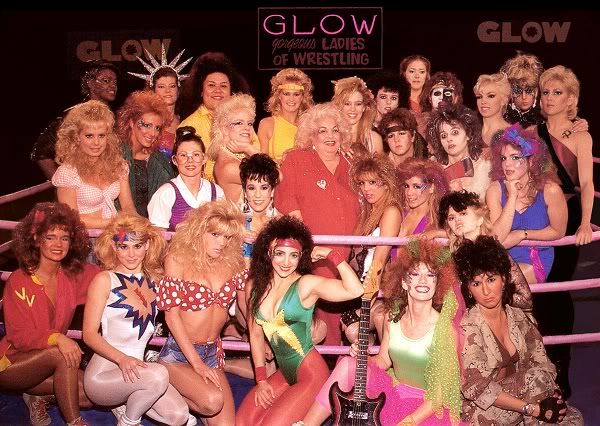
In a way, I have to give credit to David McLane, the man who founded the Gorgeous Ladies of Wrestling (GLOW) promotion in 1986. You might not necessarily have liked the style of professional wrestling that he developed, but, in a world where many people getting into the wrestling game have decided that their only bet is to copy exactly what Vince McMahon is doing (Hi, TNA), McLane developed an original formula for a promotion that a lot of people have copied over the years, whether it was the folks who subsequently came into ownership of GLOW, the 2003 unaired television program CRUSH, and the recent Wrestlicious program that briefly went viral in the professional wrestling community. Simply put, GLOW was wrestling-meets-Hee Haw, giving us matches bookended by corny comedy skits and attempts at music.
The show included a few different musical endeavors, including the simultaneous release of a music video featuring the babyface side of the roster (“Good Girls Don’t”) and a corresponding video for the heel version of the roster (“Nasty and Mean”). However, the most iconic of the lot was the “GLOW Girl Rap,” during which each member of the roster would introduce herself by speaking over a beat. On paper, that’s not a horrible concept, but the problem is that, when you get a group of women together and you’re casting those women almost exclusively on their looks, chances are good that very few of them are going to have the ability to actually rap (or wrestle, but that’s an issue for a completely different column). It’s part of an unfortunate trend in the mid and late 1980’s in which people saw that rap was hot but thought anybody could do it, when, in reality, doing it well is far more complex than most realized at the time. The GLOW raps were done and redone many times over the years to accommodate for changes in the company’s roster, but, each time, there were multiple women involved who had no sense of rhythm, no sense of diction, or both.
4. “Mighty Lex Express” by M.O.M. and Rappin’ Randy

A couple of weeks back, we took a look at Men on a Mission in connection with my list of the strangest promotional tactics for Wrestlemania. Really, it was seeing M.O.M. again in the video which made that list which inspired me to do my best and worst musical performance countdowns. And, given my comments about Mo, Oscar, and Mabel’s Wrestlemania X rap, it should be no surprise that they’re back for an entry on this list.
However, this time around, M.O.M. is not alone. As most of you will recall, as part of the buildup to Summerslam 1993, the WWF aired videos of number one contender Lex Luger supposedly driving around the country in a bus and meeting with fans to prepare himself for his championship main event against Yokozuna. (I would’ve spent that time in the gym, myself, but I guess that’s why I’m not a professional wrestler.) Apparently the top brass in the company didn’t think that was enough to build Luger up for the event, though. He needed something more. He needed a song about his campaign to win the title, and that song needed to be performed by Oscar of Men on a Mission along with . . . Randy Savage? Yes, Randy Savage. The Macho Man, who was a multiple-time WWF Champion and at this point in time essentially being portrayed as the “Babe Ruth” of the World Wrestling Federation, for reasons that to my knowledge are still unexplained, got hooked up with perennial midcarders M.O.M. for this number, which has all of the same flaws that your normal rap from Oscar has. As I noted previously, Oscar was great in terms of working a live crowd with call-and-response style rap, but it didn’t translate at all to a recorded format. Nothing was different about that issue here, and the addition of Savage didn’t really help, though he did show a few flashes of what would allow him to record his own rap album several years later.
And I’m STILL trying to figure out why Oscar was named “Low End Theory Artist of the 1990’s” by 411’s Tony Acero.
3. “I Don’t Suck” by Kurt Angle
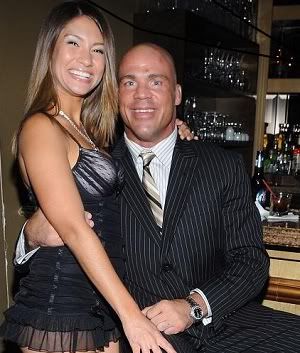
Throughout my two musical lists, I’ve made allusions to the WWE Originals album a few different times, so some of you have probably been wondering when we would finally get a full-blown entry on the list from that record.
Here it is. Originals featured the 2003/2004 WWE roster laying down a variety of god awful tracks, from a pre-Luchagors Lita displaying some incredibly weak vocals to Rikishi singing an R&B love song that, I swear, was entitled “Put a Little Ass on It.” However, there is one song from the album that sticks out in my mind as being far inferior to all of the others. It features 1996 Olympic Gold Medalist Kurt Angle, and it is entitled, “I Don’t Suck.” There are times throughout his career when I thought that Kurt Angle was made out of Teflon, because absolutely nothing sticks to the man. No matter how lame an angle is, no matter how many times he gets jobbed out, fans still absolutely love this guy. Nothing will diminish his value in their eyes. That theory was put to the test perhaps no more than when “I Don’t Suck” was unveiled.
In short, there are three problems with “I Don’t Suck.” The first is that, quite frankly, Angle can’t sing in any way, shape, or form. Even with the entire Originals album being auto-tuned to the point of absurdity, Kurt’s track is still slightly off key when he attempts to sing, and his efforts at rapping aren’t really impressive either. The second issue is that, because the song is so bad, it portrays Angle in a light in which he never should have been portrayed. Despite the guy being a legitimate badass and despite him being capable of playing an absolute dangerous psychopath of a character, WWE always seemed to want to turn him into a Santino-esque comedy figure, and this song did nothing to help that counterproductive image of Kurt. The third problem is that Angle was actually singing and rapping over a slight remix of his entrance music, which is one of the single most AWESOME bits of wrestling entrance music in history, and it is forever tainted as a result of being associated with this track.
In fact, on writing this entry, I was seriously considering moving this song up from number three to number two or number one, and, if anything, that is a testament to how truly bad it was.
2. “Never Been a Right Time to Say Goodbye” by Bret Hart
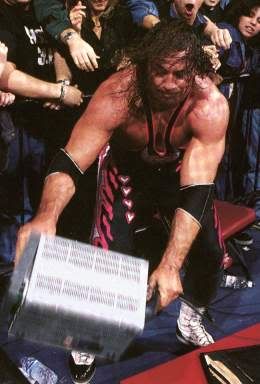
A decade before WWE Originals, the World Wrestling Federation released a record with a very similar format in Wrestlemania: The Album. In some ways, Wrestlemania on the whole is less irritating than Origianls, because the former was clearly marketed towards children whereas the latter was something that adults were apparently supposed to purchase and enjoy. However, despite the fact that Originals on the whole was more irritating than Wrestlemania, there were some individual tracks on Wrestlemania that were worse than anything on Originals.
Chief among those songs is “Never Been a Right Time to Say Goodbye,” a song that was given to then-WWF Champion Bret “The Hitman” Hart to sing. And, by “sing,” in this case I mean “recite the lyrics in his normal speaking voice.” And, by “normal speaking voice,” I mean, “a tone in which he could not possibly sound more annoyed to be asked to do this.” Bret Hart wasn’t just a bad singer or rapper, as so many other people on this list were. He was a bad singer who clearly didn’t give a fuck about his performance. He came across as a guy who was doing something that he was contractually obligated to do and wanted to do it with a bare minimum of effort.
However, that is not the only problem with “Never Been a Right Time to Say Goodbye.” Even if you were going to make Bret Hart sing a song on this album, and even if you were going to make him sing when he clearly had no desire to do so, the LEAST you could do would be to give him a song that somehow fits with his character or personality. Instead, we got Bret Hart singing a love song about how he didn’t want to hurt his girlfriend but had to leave her regardless. What’s wrong with that? Not only is Bret not exactly a heartthrob (pun intended), but, at the time of this album, he was also portrayed on-camera as a family man who was very faithful to his wife and four children. Everybody knew that the song just didn’t fit Hart’s persona, and that was just as big of a problem as his motivation.
1. “Hulkster in Heaven” by Hulk Hogan & The Wrestling Boot Band
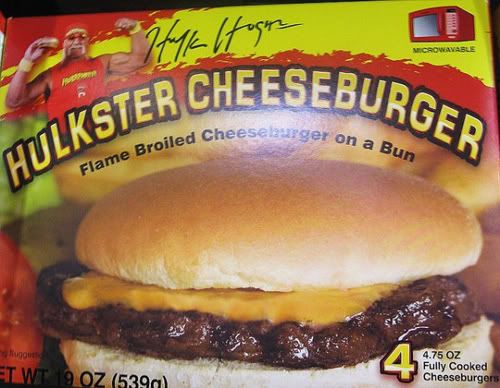
And it’s all come down to this.
The year is 1995, and Hulk Hogan is a little under a year into his run with WCW after redefining what it meant to be a professional wrestler while he was under the WWF banner. During his time in the Fed, Hogan had become the ultimate kiddy hero, an untarnished paragon of virtue that every little Billy, Susie, and even Jimmy in the audience could look up to. However, after the initial glow of Hogan jumping to WCW wore off, cracks started to show in the old Dudley Do-Right act. Fans who followed Hogan to WCW from the WWF were growing tired of seeing the same routine over and over again, and fans of pre-Hogan WCW were having a hard time accepting him over Ric Flair and Sting. A Hogan backlash started to grow, which would set into motion the wheels that would ultimately lead to him turning heel and joining the nWo, bringing professional wrestling into its biggest boom period in history in the process.
However, before Hogan turned to the dark side, there was one last act of uber-good guy-ness that he needed to perpetrate. He needed to release Hulk Still Rules, an album in which he sang for ten solid tracks, backed by the fictional “Wrestling Boot Band” and helped out by longtime friend and former Gentrys vocalist Jimmy Hart. Hogan’s version of the story (which is Hogan’s version of the story, so you have to take it with a grain of salt) is that he was inspired to record and release this album as a benefit for the family of a young fan with a terminal illness, who the Hulkster had met through his work with the Make-a-Wish Foundation.
The fact that this story exists (whether I believe it is true or not) almost makes it difficult for me to list any portion of the album on this list because, even if it sucks, it’s a benefit to pick up the medical bills for a sick kid. Yet, upon listening to the last track of the album, “Hulkster in Heaven,” any reservations that I have about topping my “worst” list with the song completely dissipate.
Why? Because, even if this is a tribute to a dead child, it manages to be the dirt worst, most offensive tribute to a dead child that anybody has ever done. First of all, the song is a technical nightmare, dated even by mid-1990s standards and featuring a Casio keyboard performance that makes it sound like Wesley Willis was a member of the Wrestling Boot Band. The actual quality of the song is the smallest problem that I’ve got with this, though. The biggest problem is that Hogan, at the height of his reported backstage egomania in wrestling, PUTS HIMSELF OVER THE DEAD CHILD. Seriously, he takes what had the potential to be a touching tribute and turns it into a Hulk Hogan love-fest, going on at length about how sad this makes him feel and about how he can’t wait to be reunited with the child in heaven. Yeah, because that’s what everybody cares about when a kid dies . . . what a celebrity who met him once or twice thinks.
This one didn’t just bother me on a musical level. It actually bothered me on a moral level, and that’s why it makes number one over all of the other god awful songs that wrestlers have recorded throughout history.
More Trending Stories
- Backstage Notes From WWE Draft Night 1 on SmackDown, Why There Were So Few Roster Changes
- Jim Ross Thinks Randy Orton’s WWE Backlash 2004 Match Put Him On The Map
- More 2024 WWE Draft Picks Continue Following SmackDown, Updated Draft List
- New QR Code on WWE SmackDown Reveals Survey & Uncle Howdy Teases







